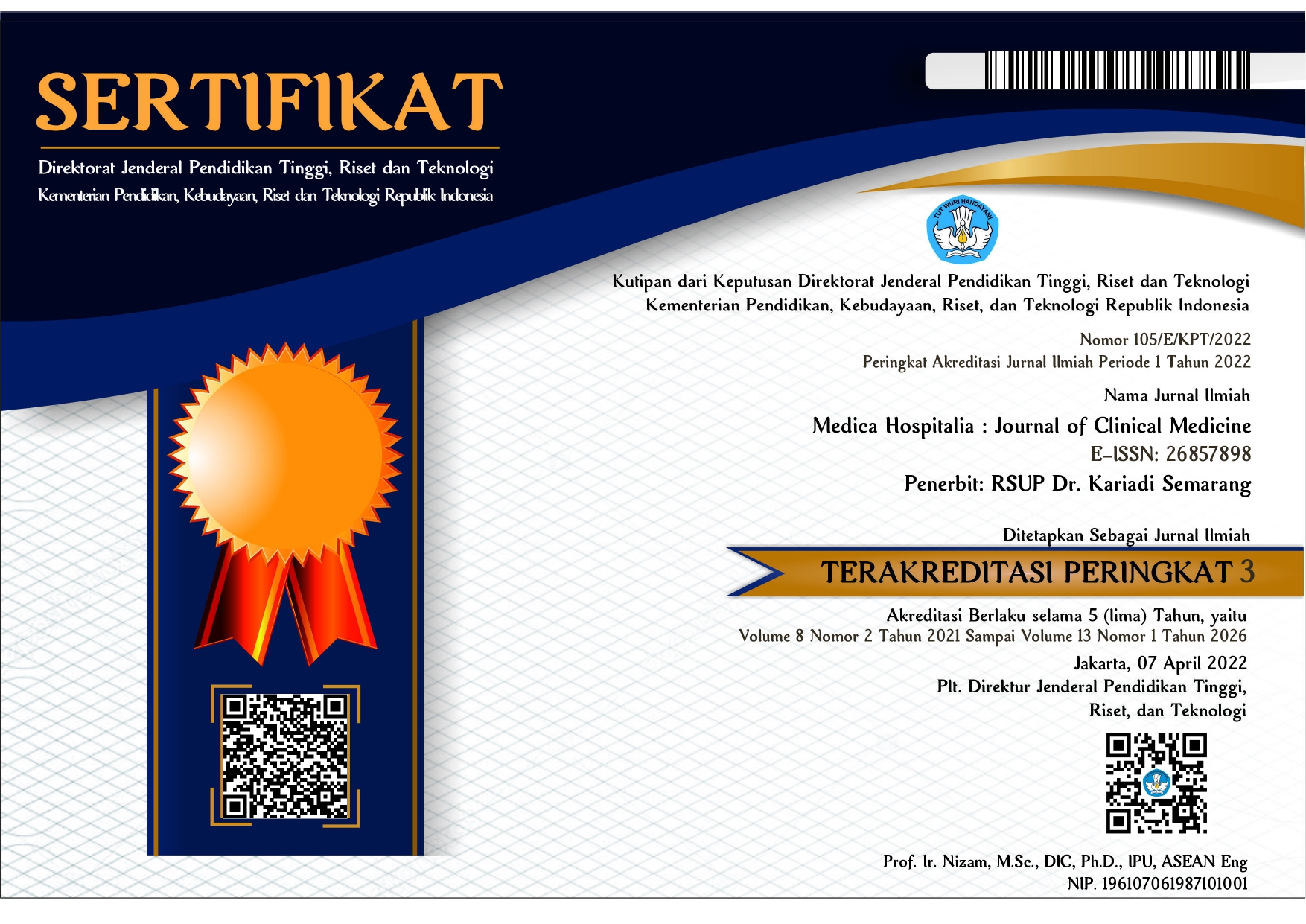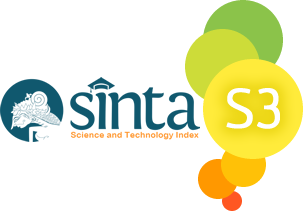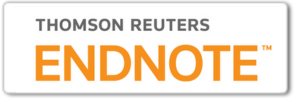Effect of Genistein-rich Edamame Extract on Eosinophil-Lymphocyte Ratio
DOI:
https://doi.org/10.36408/mhjcm.v11i2.1068Keywords:
Genistein Rich Edamame, Eosinophil-Lymphocyte RatioAbstract
BACKGROUND : Atherosclerosis is associated with hypercholesterolemia and inflammation. Edamame, a high-genistein soybean variant, is believed to have protective effects against atherosclerosis.
AIMS : This study aimed to determine the influence of edamame extract rich in genistein on the eosinophil-lymphocyte ratio (ELR) levels in rats induced with atherosclerosis.
METHOD : This research utilized a true experimental design with a post-test only control group. Thirty male rats were divided into five groups: negative control, positive control, treatment 1 with edamame extract supplementation, treatment 2 with edamame extract rich in genistein supplementation, and treatment 3 receiving atorvastatin. After 28 days, the ELR levels were examined from rat blood. Data were analyzed using One-Way ANOVA - Bonferroni, Kruskal-Wallis – Mann-Whitney, and Pearson correlation tests.
RESULT : There were no significant differences in ELR levels (p>0.05) among all treatment groups compared to the negative and positive control groups. T-tests between the negative control and positive control groups, as well as between the positive control and the three treatment groups successively, showed non-significant results (p: 0.376; 0.856; 0.169; 0.066).
CONCLUSION : The administration of edamame extract rich in genistein did not significantly reduce inflammation levels in blood vessels compared to edamame extract alone, as indicated by non-significant results in the ELR difference analysis.
Downloads
References
1. Wentzel JJ, Van der Heiden K. Animal models of surgically manipulated flow velocities to study shearstress-induced atherosclerosis. Cardiology J Pharmacol Jornal. 2015;241(1):100–110.
2. Fishbein MC, Fishbein GA. Arteriosclerosis: Facts and fancy. Cardiovasc Pathol. 2015; 24(6):335–42.
3. Kesumasari C. Prediction model of suspected coronary heart disease among individuals and community in Indonesia. Makassar: Universitas Hasanuddin Press. 2009. p.1-11.
4. MOH National Institut of Health Research and Development (INA). Sample Registration System; Jakarta. 2015. p1-5.
5. Hansson GK. Inflammation, atherosclerosis, and coronary artery disease. N Engl J Med. 2005;352:1685-95
6. Libby P. Inflammation in atherosclerosis. Nature. 2002 Dec 19-26;420(6917):868-74
7. Ohira T, Iso H. Cardiovascular disease epidemiology in Asia. Circ J . 2013;77(7):1646–52.
8. Bergheanu SC, Bodde MC, Jukema JW. Pathophysiology and treatment of atherosclerosis: Current view and future perspective on lipoprotein modification treatment. Neth Heart J. 2017 Apr;25(4):231–42.
9. Sudaryanto T. Bean Consumption in Indonesia. Bogor: IPB-Press. 1996. p.238-260.
10. Soy beans. 2016;1–25. Available from: URL: http://www.herbeoofficinali.org.
11. Pandit NT, Patravale VB. Design and optimization of a novel method for extraction of genistein. Indian J Pharm Sci. 2011;73(2):184–92.
12. Gandasoebrata R. Clinical Laboratory guides. Dian Rakyat. Jakarta. 2004.
13. Xu Y. Textural and microbiological qualities of vegetable soybean (edamame) affected by blanching and storage conditions. J Food Process 2017;03(07).
14. Fardhani, R. A., Reza Dian Pratama, Nani Maharani, Bahrudin, Yuriz Bakhtiar, M Ali Sobirin, & Farmaditya EP Mundhofir. (2021). The Efficacy of Genistein-Rich Edamame as a Prevention of Atherosclerotic Lesion in Abdominal Aorta: Study in Rats Model of Atherosclerosis. Bioscientia Medicina : Journal of Biomedicine and Translational Research, 5(10), 968-975. https://doi.org/10.32539/bsm.v5i10.414
15. Goh YX, Jalil J, Lam KW, Husain K, Premakumar CM. Genistein: A Review on its Anti-Inflammatory Properties. Front Pharmacol. 2022 Jan 24;13:820969. doi: 10.3389/fphar.2022.820969. PMID: 35140617; PMCID: PMC8818956.
16. Tosu AR, Kalyoncuoğlu M, Biter Hİ, Çakal S, Çakal B, Selçuk M, Çinar T. Association of eosinophil-to-lymphocyte ratio with coronary slow-flow phenomenon in patients undergoing coronary angiography. Arch Med Sci Atheroscler Dis. 2022 Jul 7;7:e29-e35. doi: 10.5114/amsad.2022.116662. PMID: 35846412; PMCID: PMC9278170.
17. Ohkuma R, Kubota Y, Horiike A, et al.. The prognostic impact of eosinophils and the eosinophil-to-lymphocyte ratio on survival outcomes in stage II resectable pancreatic cancer. Pancreas2021; 50: 167-75.
Additional Files
Published
How to Cite
Issue
Section
Citation Check
License
Copyright (c) 2024 Reza Dian Pratama, Edwin Basyar, Aries Sudjarwo (Author)

This work is licensed under a Creative Commons Attribution-ShareAlike 4.0 International License.
Copyrights Notice
Copyrights:
Researchers publishing manuscrips at Medica Hospitalis: Journal of Clinical Medicine agree with regulations as follow:
Copyrights of each article belong to researchers, and it is likewise the patent rights
Researchers admit that Medica Hospitalia: Journal of Clinical Medicine has the right of first publication
Researchers may submit manuscripts separately, manage non exclusive distribution of published manuscripts into other versions (such as: being sent to researchers’ institutional repository, publication in the books, etc), admitting that manuscripts have been firstly published at Medica Hospitalia: Journal of Clinical Medicine
License:
Medica Hospitalia: Journal of Clinical Medicine is disseminated based on provisions of Creative Common Attribution-Share Alike 4.0 Internasional It allows individuals to duplicate and disseminate manuscripts in any formats, to alter, compose and make derivatives of manuscripts for any purpose. You are not allowed to use manuscripts for commercial purposes. You should properly acknowledge, reference links, and state that alterations have been made. You can do so in proper ways, but it does not hint that the licensors support you or your usage.

























